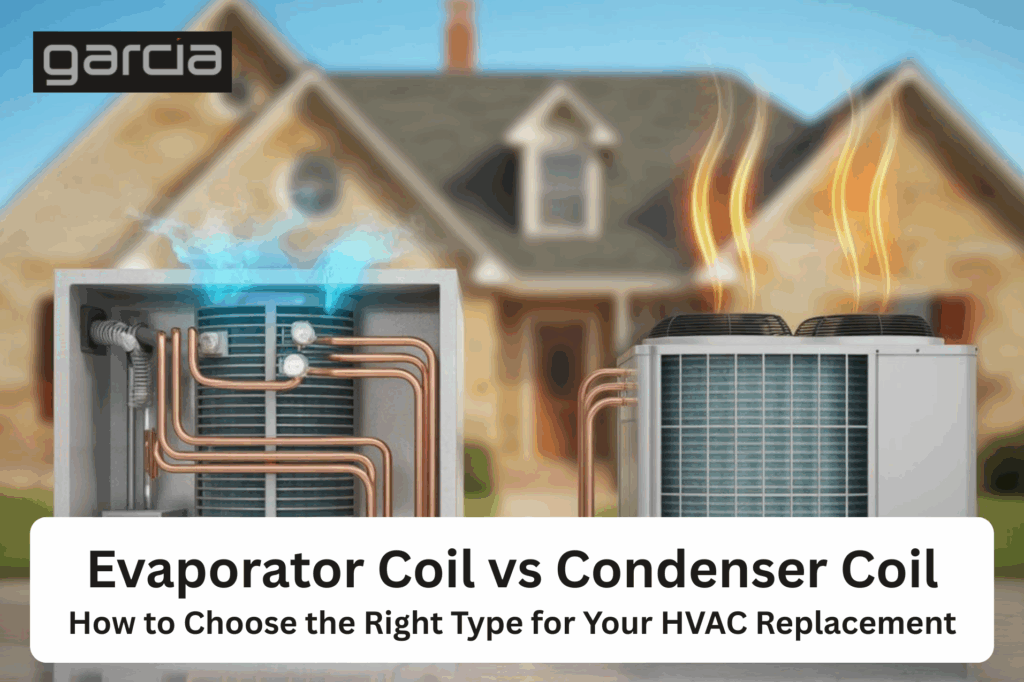The evaporator coil vs condenser coil are two of the most important parts of an HVAC system when it comes to performance and energy efficiency. Texas homes and businesses that suffer from long, hot summers and heavy humidity might really benefit from knowing how each one works and how to choose the proper one for replacement.
In this article, we’ll talk about the differences between evaporator and condenser coils, what they’re made of, how they’re used, and what to look for when you buy new or replacement coils.
What is an evaporator coil?
In the comparison of Evaporator Coil vs Condenser Coil, the evaporator coil plays the role of cooling the indoor air. The evaporator coil is inside the interior unit of your HVAC system and is normally coupled to the furnace or air handler. Its major purpose is to take heat out of the air inside. The refrigerant inside the evaporator coil absorbs heat from the heated air that comes in from outside. This cools the air before it goes back through the ducts.
The Evaporator Coil’s Most Common Uses
- Keeps the inside cool by taking heat from the air within.
- Starts the cooling cycle by working with the refrigerant
- Helps keep humidity levels in check in places with a lot of moisture, like Texas.
Always check to see if the evaporator coil you want to buy will work with your current system, what type of refrigerant it uses (such as R-410A or R-32), and how energy-efficient it is.
If you need to buy new components or coils, you may look into reputable HVAC Products that work with both residential and light commercial systems.
What is a coil for a condenser?
The HVAC system’s exterior unit has the condenser coil. The refrigerant takes in heat from inside the building and then moves to the condenser coil, where it lets that heat out into the air outside.
Common Uses of the Condenser Coil
- Releases the heat collected from inside the home
- Converts refrigerant gas back into a liquid form
- Supports energy efficiency and system longevity
The HVAC condenser coil is made to work in the weather outside, which in Texas means heat, dust, and storms now and again. Depending on the setting and how much upkeep you want to do, copper or aluminum are good choices for long-lasting materials.
The main differences between the evaporator coil and the condenser coil
Both coils are important for cooling, although they do different things:
| Feature | Evaporator Coil | Condenser Coil |
| Location | Indoor unit | Outdoor unit |
| Primary Function | Absorbs heat from inside | Releases heat outside |
| Heat Exchange Direction | Endothermic (absorbing) | Exothermic (releasing) |
| Temperature | Cold surface | Hot surface |
| Maintenance Needs | Clean airflow and condensate drain | Debris removal and airflow clearance |
| Exposure | Protected (indoors) | Exposed (outdoors) |
What needs to be done for maintenance
- Clean the airflow and the drain for the condensate.
- Taking away trash and clearing the way for air to flow
- Protected from exposure (inside)
- Outdoors and exposed
For the HVAC system to work well, both coils need to work together. If one coil breaks or gets dirty, the other needs to work harder, which uses more energy and could put stress on the system.
Copper and aluminum are two types of coil materials
One of the most often things questions is, “Is copper or aluminum a better coil material?”
- Coils of Copper: Have better thermal conductivity and are easier to clean or fix. They are commonly utilized in high-end systems or where long-term dependability is important.
- Coils of Aluminum: Less expensive and lighter, but repairs can be more difficult. Many newer systems employ aluminum coils since they don’t rust.
Corrosion-resistant materials are very vital for Texas’s coastal areas, such as Beaumont and Port Neches, where humidity and salt are widespread. That’s why people in the area typically buy coated copper or high-quality aluminum coils from reputed HVAC Supply Beaumont.
Picking the Right Coil for HVAC Replacement.
When choosing new coils, remember these things:
- Choose the Right Type of System
Always pick coils that are the right size and kind of refrigerant for your HVAC system and that are set up in the right way (upflow, downflow, horizontal, etc.).
- Make sure they work together
Using the wrong type of coil or one that doesn’t match can make things less efficient and cause problems with the compressor.
- Put energy efficiency first
Modern coils are made to function with systems that have a greater SEER rating. Choose coils that utilize the least amount of energy, especially in hot places like Texas.
- Think about how easy it is to maintain
Coils that are easy to clean or coated to prevent rust can save money in the long run in places that are dusty or humid.
- Pick a Local Supplier You Can Trust
If you need to buy a lot of something or replace something, getting it from a trusted local distributor like HVAC Supply in Port Neches will make sure you get the real thing, get it faster, and get help from people who know the area.
How to Care for Your Coils So They Last Longer
Even the greatest coils need to be taken care of on a regular basis. A few simple steps can make a tremendous difference:
- Clean the filters in your home so they don’t get blocked.
- Clear away any leaves or other debris from surrounding the exterior condenser.
- Look for leaks in the refrigerant regularly.
- Don’t spray high-pressure water directly on the coil fins.
- Plan to check things out regularly during the off-season.
If you follow these tips, your coils will operate better and use less energy. This is good for both comfort and saving money in Texas’s tough weather.
What Texas homeowners and contractors should know about coils
In Texas, coil performance is even more critical because HVAC systems run all year. If homeowners, contractors, and property managers know what the evaporator coil vs condenser coil do, they can make better choices when they acquire things.
If you’re replacing an existing unit or buying a number of new ones for a project, it’s crucial to know about coil types, materials, and compatibility so that they perform properly and last a long time.
Final Thoughts
In the comparison between evaporator coils and condenser coils, it’s not about which one is “better.” It’s about how they work together to keep your HVAC system functioning smoothly. It’s usually a good idea to check the other for long-term dependability and balanced performance when one is improved or replaced.
If you need reliable HVAC Products or high-quality coil replacements, check out our HVAC Supply in Beaumont and HVAC Supply in Port Neches stores for parts that will last in Texas weather.


